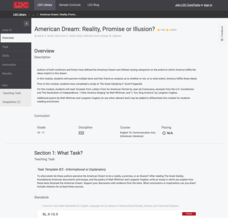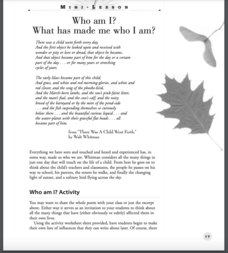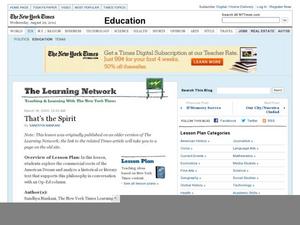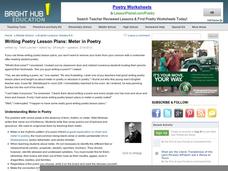Curated OER
An Interdisciplinary Approach to Learning with Walt Whitman
Use poetry as a mode for creating interest and cross discipline learning.
Curated OER
Literary Response and Analysis
Examine a variety of literary responses to Abraham Lincoln's death and the impact of perception. Your class can work in writing groups to analyze either poetry, eulogy, or a newspaper article. They retell the events of Abraham Lincoln's...
Curated OER
Letters to Poets
Add a strong poetry activity to your literature unit. Middle and high schoolers investigate their writing voices with journaling and group discussion, then choose a famous poet to study. They write letters to their chosen poets,...
Literacy Design Collaborative
American Dream: Reality, Promise or Illusion?
Dream or nightmare? Class members craft a synthesis essay with textual to determine to what extent the United States has fulfilled the ideas embodied in the America Dream.
Curated OER
Whitman and Lincoln
Students determine if Lincoln and Whitman ever met and write a dialogue between the two men. In this Whitman and Lincoln instructional activity, students read Whitman's poem "Beat! Beat! Drums!" and connect it to the events of Lincoln's...
Lafayette Parrish School System
Teaching Tone and Mood
Tone and Mood are not synonymous! Introduce young readers to these literary devices with a series of exercises that not only point out the significant differences between the terms but also shows them how to identify both the tone and...
Curated OER
"Crossing Brooklyn Ferry"
Young scholars study transportation in mid-19th-century Brooklyn. They look at several photographs of Brooklyn transport from the era and read Walt Whitman's poem "Crossing Brooklyn Ferry." In addition to making critical
observations and...
Curated OER
Poetry of the City
Students explore Walt Whitman and about poetry. Most importantly, it teach them that poetry is something anyone can write and encourage them to tell the story of their own community in verse
Curated OER
Crossing Brooklyn Ferry Questions
In this reading comprehension learning exercise, students respond to 6 short answer and essay questions based on "Crossing Brooklyn Ferry," by Walt Whitman.
Curated OER
When I Heard the Learned Astronomer
High schoolers recognize different purposes and methods of writing and to identify a writer's tone and point of view.
Pearson
Langston Hughes
An author study provides learners the opportunity to explore in depth the life of, the influences on, and the works of a single literary figure. Introduce middle schoolers to Langston Hughes with a unit that models how to approach an...
Scholastic
Who Am I? What Has Made Me Who I Am?
"Everything we have seen and touched and heard and experienced has, in some way, made us who we are." Your young learners will use this resource to create lists of influences (people, animal, nature, places, etc.) in their lives and to...
Advocates for Human Rights
Who are Immigrants?
What do Jerry Yang, Patrick Ewing, John Muir, Charlize Theron, Peter Jennings, and Saint Frances X Cabrini all have in common? They are all immigrants to the United States. Famous and not-so-famous immigrants are the focus of a resource...
Curated OER
Teaching Poetry Using DARTs
Students interact with texts. They are given the first four lines of Walt Whitman's poem "When I heard the learned astronomer." Students read them and discuss what they think Walt Whitman did when he heard the astronomer.
Curated OER
That's the Spirit
Is, as Walt Whitman contends, America’s “almost maniacal appetite for wealth,” the heart of the American dream? Class members grapple with this question as they read David Brooks’ article “The Commercial Republic,” and quotes that...
Curated OER
1900 America: Primary Sources and Epic Poetry
Using Walt Whitman's Song of Myself and Hart Crane's The Bridge as models, class groups first craft their own epic poems for 1900 and, using primary sources, create a multi-media presentation that captures the sights and...
College of the Canyons
Free Verse
Free verse poetry is often regarded as poetry without structure, but in reality, it is a poetic form that adheres to its own poet's thought and breath patterns. Delve into the rules and famous examples of free-verse poetry with a short...
Curated OER
The Penny Press, Walt Whitman and the War
Young scholars examine the Penny Press and how it began the era of mass circulated newspapers. They use the internet to research the writing style of the paper and write a short article using that style.
Curated OER
HS 204: Introduction to Literature: Poetry Section
This outline introduction for a college course covers the idea of humanities and various language forms and literature genres. Beginning with the human species and our influence on the world around us, take a very thorough look at the...
Curated OER
Meter in Poetry
A good poem has form and structure built into it. Middle schoolers see that the structure of a poem consists of stanza, form, rhyme, and meter. The structure also contributes to a poem's meaning. After listening to, and discussing, a few...
Curated OER
Astronomy Unit: For Autistic Learners
In need of a few great ways to teach an arts-enriched lesson on astronomy? This resource contains several interesting ideas that link poetry to the stars in the sky. These suggestions are very simple and could use a teachers touch, but...
Curated OER
Romanticism by Dr. Joel Peckham
What are the principles of Romanticism? This presentation aims to give learners the answer to this question complete with examples. Thirty-eight slides are offered, but a few of them are incomplete. You'll have to contribute an example...
Curated OER
Classify By Topic
Students explore and evaluate poetry. In small groups, they read and summarize poems, complete a handout, create and perform a dramatization of a poem, and write a journal entry in response to their performance.
Curated OER
Poet James Whitcomb Riley: Famous in His Own Day
An engaging biography of "Hoosier" poet James Whitcomb Riley serves as a springboard for study of his unique dialect-based verse. Several activities illuminate differences between spoken vernacular and formal language. Learners record...

























